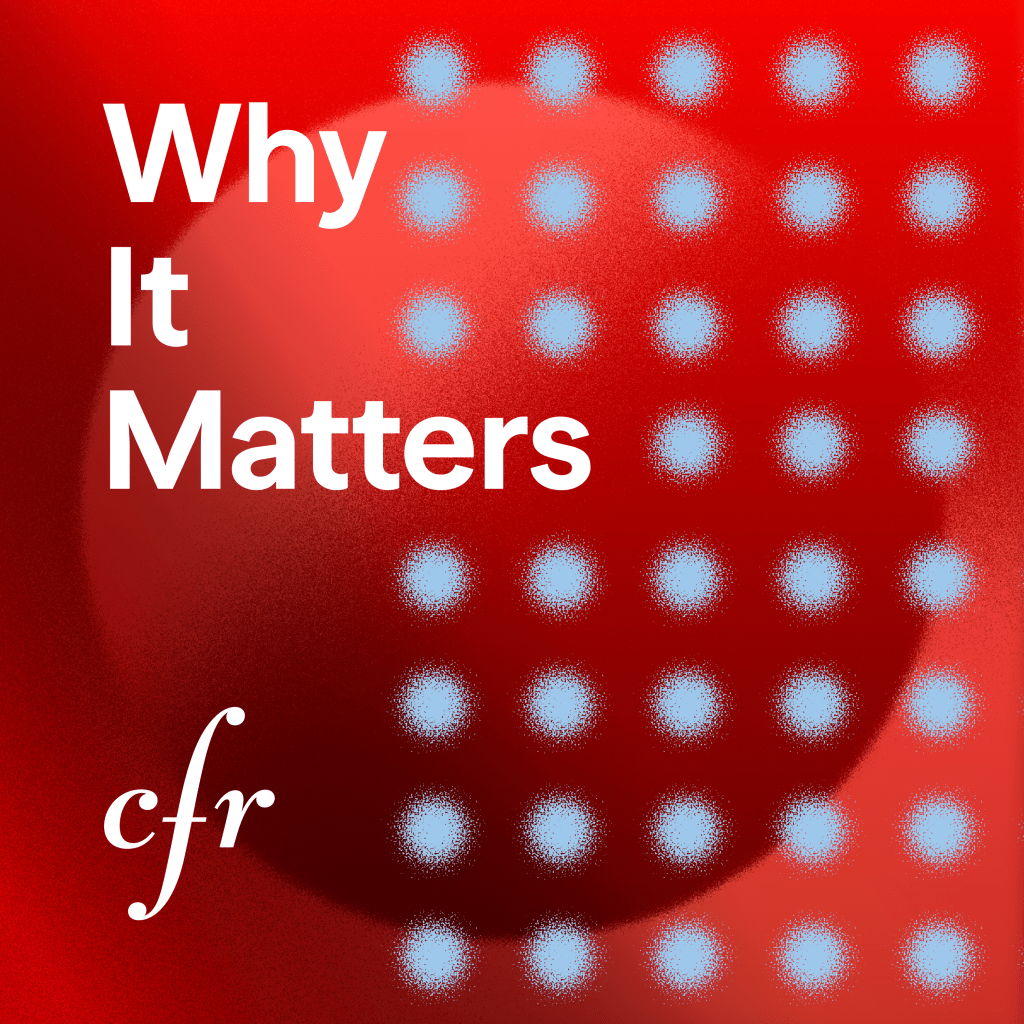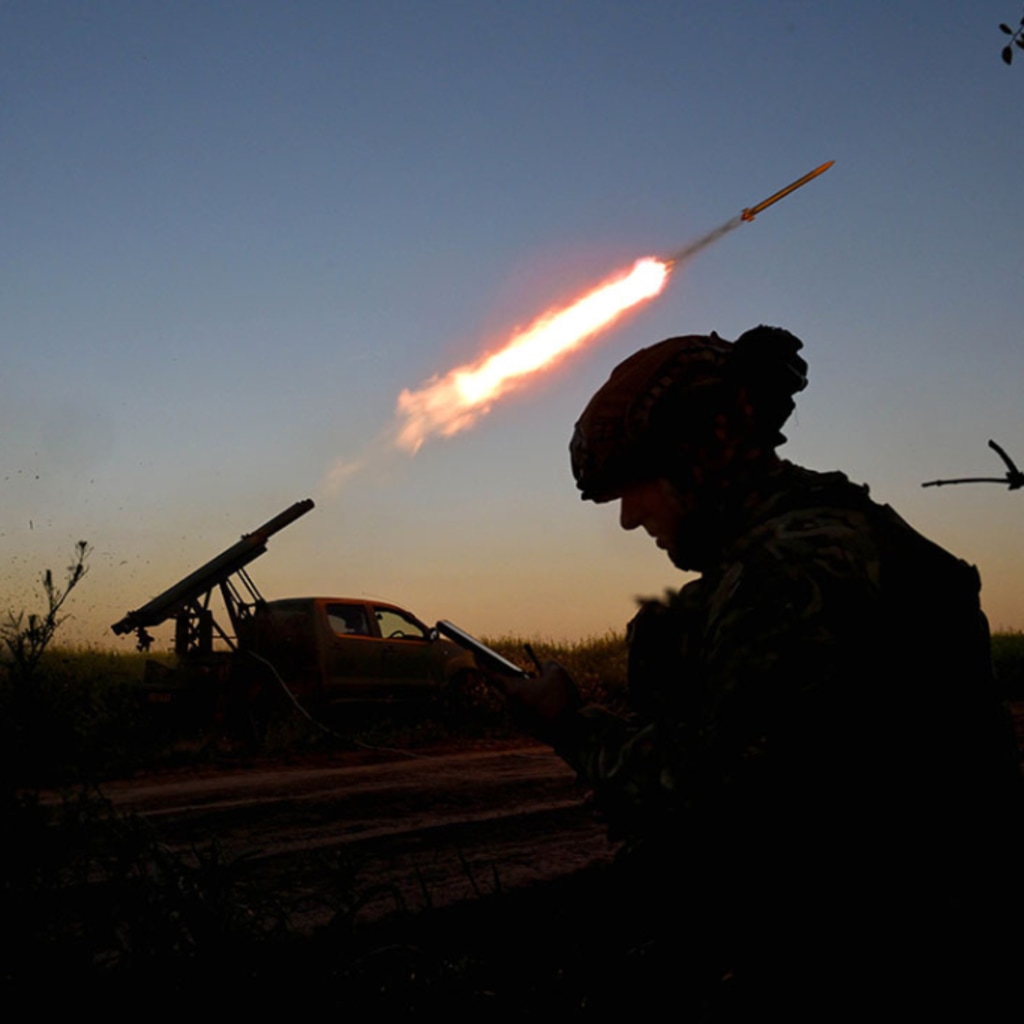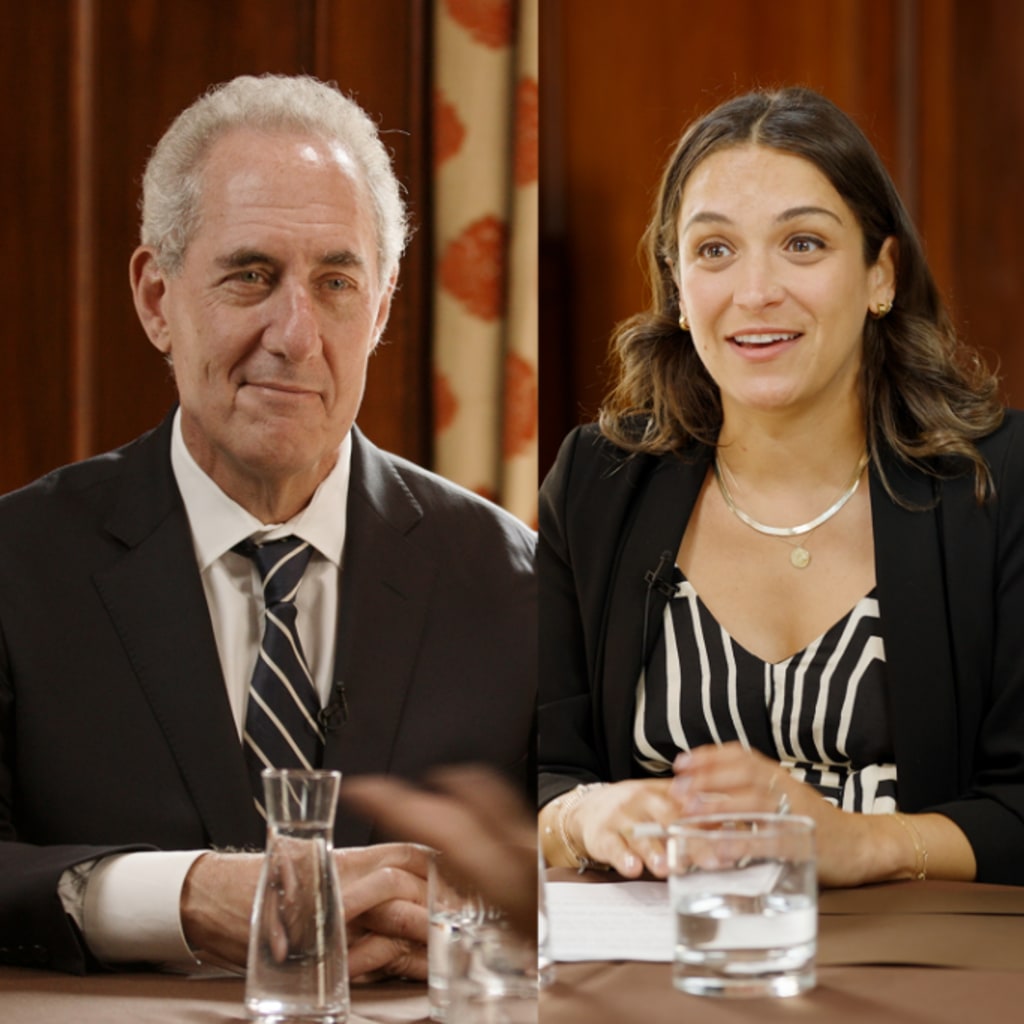Remembering the Rwandan Genocide
Thirty years ago, Rwanda’s government began a campaign to eradicate the country’s largest minority group. In just one hundred days in 1994, roving militias killed around eight hundred thousand people. Would-be killers were incited to violence by the radio, which encouraged extremists to take to the streets with machetes. The United Nations stood by amid the bloodshed, and many foreign governments, including the United States, declined to intervene before it was too late. What got in the way of humanitarian intervention? And as violent conflict now rages at a clip unseen since then, can the international community learn from the mistakes of its past?
Published
Host
- Gabrielle SierraDirector, Podcasting
Guests
- David J. SchefferSenior Fellow
- Claude GatebukeExecutive Director of the African Great Lakes Action Network
Supervising Producer
- Asher RossLead Content Strategist
Audio Producer and Sound Designer
- Markus ZakariaAudio Producer & Sound Designer
Associate Podcast Producer
- Molly McAnanyProducer, Podcasts
Show Notes
From April to July 1994, extremists from Rwanda’s Hutu majority killed almost eight hundred thousand members of its Tutsi minority and tens of thousands of moderate Hutus. The genocide was largely perpetrated by civilians whose flames of hatred were stoked by the radio and other media. Yet as armed mobs roamed the streets in search of victims, foreign governments including Washington equivocated at home about whether the killings constituted genocide, and UN peacekeepers stood by in Rwanda, restrained by their charter from stopping the mounting violence.
The massacres left an indelible mark on Rwanda, which is still led by President Paul Kagame, the military commander who took power soon after his forces ended the genocide. And while Rwanda has made great strides toward development in the past thirty years, critics say they have come at the cost of Kagame’s increasingly repressive rule.
From CFR
Mariel Ferragamo, “Thirty Years After the Rwandan Genocide: Where the Country Stands Today”
Phil Clark, “Rwanda’s Recovery: When Remembrance Is Official Policy,” Foreign Affairs
From Our Guests
Helen Epstein and Claude Gatebuke, “The Roots of Rwanda’s Genocide,” New York Review of Books
Claude Gatebuke et al., Survivors Uncensored: 100 Stories of Inspiration and Humanity From the Rwandan Genocide
David Scheffer, “Lessons from the Rwandan Genocide,” [PDF] Georgetown University
Read More
Anjali Dayal, “Beyond ‘Do Something’: Revisiting the International Community’s Role in the Rwandan Genocide,” War on the Rocks
Jean Hatzeld, Blood Papa: Rwanda’s New Generation
Jina Moore, “What the West Gets Wrong About the Rwandan Genocide,” The Nation
Declan Walsh, “From the Horror to the Envy of Africa: Rwanda’s Leader Holds Tight Grip,” New York Times
Watch and Listen
“Why Is Rwanda’s Leader Sowing Chaos in the Congo,” Foreign Affairs Interview
Transcript
Claude GATEBUKE: I knew for sure that day was my last day. I was gonna die that day. While I was counting my minutes and my seconds, I wanted the world to know what is happening to us, that the whole truth will eventually come out of what really happened in this place.
On the eve of April 1994, Rwanda was by far the most densely populated country in sub-Saharan Africa. 100 days later, that was no longer true. In that short time period, as many as 800,000 people — 10 percent of Rwanda’s population — had been killed, and over 2 million had been displaced. Tens of thousands died before most of the world even knew what was going on, and even after the genocide became clear, many powerful countries sat on the sidelines.
The scar from the genocide is still healing. And its legacy continues to have major implications for Rwanda itself, and for the question of whether the international community is capable of stopping mass atrocities before it’s too late.
I’m Gabrielle Sierra, and this is Why It Matters. Today, the story of the Rwandan genocide, 30 years later.
David SCHEFFER: During the Rwandan genocide, which was April 6 of 1994 through somewhere within the month of July, there was on the average 8,000, mostly Tutsis, slaughtered a day, every single day.
This is David Scheffer. He’s a Senior Fellow focusing on international law and criminal justice here at the Council. At the time of the Rwandan genocide, David served as senior advisor for Madeleine Albright, then the U.S. Ambassador to the United Nations. In 1997, he became the first ever U.S. Ambassador at Large for War Crimes Issues, and in this role, he negotiated the creation of the Rwanda War Crime Tribunal.
SCHEFFER: There were some Hutus in the death count. There had been intermarriage for decades in Rwanda. So you had many couples, one being Tutsi, one being Hutu. But that marriage proved to be deadly for both of them because they were associated with each other.
Hutus are by far the largest ethnic group in Rwanda and Tutsis comprise the largest ethnic minority. In 1994, Hutus made up about 85 percent of the population, and Tutsis about 14 percent. Ethnic divisions between the two groups were stoked during the colonial era by Belgian colonizers, fueling hatred that would eventually spiral into genocide.
SCHEFFER: Machetes were circulated in the thousands to thousands of Hutus. And it was, shall we say, the average Hutu who simply slaughtered the average Tutsi. It wasn’t as if the Hutu army in large mass assaults on Tutsis wiped them out. Now, the army was involved, definitely, but it was also just the masses that were stoked up with incitement over the Rwandan radio to hate the Tutsis.
Radio Mille Collines - known as RTLM - was a popular radio station. In 1994, the extremist Hutu government used the station to incite violence.
During the genocide, broadcasters and radio guests regularly encouraged listeners to search for and kill Tutsis, who they called “cockroaches.” What you are about to hear are clips of this propaganda, which the Rwanda War Crimes Tribunal later determined to be a crime against humanity.
Radio Mille Collines Radio Transmission:
SCHEFFER: So there was a tremendous amount of propaganda that had stoked up the Hutu population just as back in Germany in the 1930s, it was radio and print in Germany that stoked up the Germans to go after the Jews. So the same tactic was employed in Rwanda and radio was the primary instrument of reaching the Hutu population to simply go after the Tutsis.
Gabrielle SIERRA: Okay, so before you go any further, I want to ask a question that may be hard to answer, because there’s debate about it. What is a genocide? How do you define it?
SCHEFFER: Genocide is the destruction in whole or in part of an ethnic national racial or religious group, and with the specific intent to do so.
SIERRA: And in this case, in Rwanda, it was a matter of two groups within a country rather than a genocide perpetrated by one country against a group within another.
SCHEFFER: What you identify, Gabby, is actually the most common instance of genocide, which is that it’s an internal power grab, quite frankly, by wiping out a minority population and making that the mission of the population to do so, you can enhance your own political power and give the people a reason to express their own resentments in a very, very bloody and decisive way - resentment stoked up by the government itself, making the Tutsis a very ripe target.
SIERRA: Can you tell me a little more about the immediate events leading up to the genocide? I know there was a series of Hutu killings of Tutsis in neighboring Burundi, which has a similar ethnic makeup to Rwanda.
SCHEFFER: Yes, it began to occur most prominently in 1993 when a lot of discord erupted not only in Rwanda, but most prominently in Burundi, next door to Rwanda. And these are long-festering disputes between the Hutu population and the Tutsi population in that part of the world. At that time, the United States had experienced a very dark moment in Africa with the tragedy that occurred in Somalia in 1993 when a number of U.S. servicemen were killed in Mogadishu during a rescue operation. And that began to sour the attitude in Washington and in the new Clinton administration to really any significant U.S. military engagement on the African continent. That’s why when this killing took place in neighboring Burundi, it did not ignite a sense of immediate reaction in Washington to, “Well, should there be a response to this? Should we be more proactive on the ground in Africa following the Burundi massacres?” And the general consensus was no. That takes us to 1994 in Rwanda. And beginning in about January of 1994, there were things happening on the ground in Rwanda that were pointing towards the possibility of a massive Hutu assault on the Tutsi minority population in Rwanda. And there’s been a tremendous amount written about this, of course, in terms of what were the indicators that should have been more seriously considered by all parties at the UN, in Europe, in the United States. It wasn’t as if there was a pronouncement to the world that genocide is being unleashed in Rwanda. No one really knew that that was literally the plan, and that that was the prospect of the following months. Rather, it was sort of like in Burundi, you see reports that attacks are being undertaken, people are being killed. And the immediate reaction in Washington was to say, “Well, how could we get the peace negotiations that have been underway between the Tutsis and Hutus, how could we reactivate that and strengthen it so as to stabilize the situation and stop these killings?” And that was a normal Washington reaction, you know, get the peace talks going again, stabilize the situation. But that was not going to happen as we found out, and as the weeks progressed, the killings turned into a nightmare of genocide.
The genocide unleashed decades of strife within Rwanda, especially on the Tutsis. But instability had already become the norm in the country when war broke out three and a half years earlier. In October 1990, a group of exiled rebel Tutsis known as the Rwandan Patriotic Front, or RPF, invaded Rwanda from its northern neighbor Uganda, kickstarting a war with the Hutu government.
Claude GATEBUKE: I was 10 years old, when I realized and noticed there were problems in Rwanda. I was born in the rare African middle class where both my parents actually were employed. And even though I was around a lot of poverty, I had a lot of privileges. I grew up mostly caring about what was I going to eat? Can I sleep over at my friend’s house? My next soccer game - that’s all that really mattered the most to me growing up as a kid. And growing up, things like ethnic tensions and all of that were invisible things. And it wasn’t really until when the genocide started that it became clear that my mother was Tutsi my father was Hutu. That’s when it became really clear to me.
This is Claude Gatebuke, a survivor of the Rwandan genocide who is now an advocate for human rights at the African Great Lakes Action Network, based in Nashville, Tennesee. He’s also a co-author of the book, Survivors Uncensored: 100 Stories of Inspiration and Humanity From the Rwandan Genocide.
GATEBUKE: Some of the kids knew they were Tutsis, others knew they were Hutus, many did not know. Then we started finding out that Rwanda does have multiple groups, and although we all look alike, we all speak the same language and everything, when it goes back to ancestry, it traces back to these ethnic groups. And then October 1st, 1990, up until that day, I had never seen soldiers dressed for combat, never even seen a rifle or weapon other than clubs that the policemen carried. Soldiers, you know, they didn’t carry any weapons. And at first I thought somebody was shooting a movie in Rwanda. Eventually the teacher stopped class, it was lunch break, and the teacher started talking about how Rwanda had been invaded by rebels coming from the north of Rwanda, which north of Rwanda was another country. And so this group of rebels were actually Rwandans who either were children or descendants of exiled Rwandans. These exiled Rwandans were mostly of Tutsi ethnicity. So the war went on for four years, and many of the things that characterized that war were not just ordinary war of soldiers fighting soldiers. There was over a million people in Kigali, the city that I lived in, who were fleeing that war. To give you a perspective, in America, imagine if 30 million Americans moved, or 40 million Americans moved into your town or your city. In addition, the war now brought in a bunch of weapons. Now they had access to guns and grenades, and we started hearing explosions, almost every night in Kigali. And so these groups were all, at times, rioting and fighting each other to the extent that we didn’t know that we would make it home after school.
For three and a half years, Claude went to and from school in the shadow of war. But nothing could prepare him — and the rest of Rwanda — for a plane crash in April 1994 that killed Rwanda’s President and set off the genocide.
BBC News Africa: On the night of sixth of April, 1994, a plane carrying president Juvénal Habyarimana and his Burundian counterpart Cyprien Ntaryamira, both Hutus, was shot down. Killing everyone onboard.
France 24: Within hours mass ethnic killings erupt across the country, targeting members of the Tutsi minority and moderate Hutus.
GATEBUKE: After that, we started hearing shelling, and we would hear the shells exploding on one side and whistling over our heads and boom on the other side. And this was so frequent that children started playing a game of ‘guess when it’s going to explode?’ That night it was such a nightmare. It was me, my mother, my two sisters in the house. My father, he actually was in the U.S. when the genocide started. And what we heard was things crumbling, like structures crumbling, people screaming for help, dogs barking, animals making noise, all kinds of things. I started shaking. My stomach was bubbling. I would take off one way thinking I needed to go pee, and I would hear an explosion and run the other way, and then it would explode on the other side. And I was all over the place. And then eventually I became numb. The next day we went out to see what happened to the people around us. And when we got out there the structures were still there, the people were really scared, the explosions were still going. And then out of nowhere, these groups of extremist, young Hutu militias, started going house to house hunting down Tutsis to kill them. You have neighbors and civilians and people in villages who had no clue what was going on, picking up machetes and going and killing people. It was chaotic killings that had spread around like wildfire. And the RPF, the rebel group, didn’t stop killing people either. They were shelling the city. They were trying to get everybody out of that city so they can take it over. They were a lot more organized than these Hutu militias. The Hutu militias were killing people with hand weapons and bodies were piling up on the side of the streets. So the country became a stench. I mean, the stink, going outside, even thinking about it right now, I want to throw up because you would be hit with the smell of decomposing human flesh, gunpowder, burning structures, smoke, dust, all of that mixed in. And the whole place was covered with basically a big dark mushroom of all of that smoke in the air. And at night, of course, it was flashes all over the place with the bombs and the bullets and everything that was flying around. We went into hiding and we hid in a storage shed next to a dog house. And at night, we would hear voices of people looking for us inside of the house. Then after some time, some neighbors came and found us, and they bundled us up in blankets, and they smuggled us out of our place and took us to another neighbor’s place. Most people who survived were sheltered by their Hutu neighbors. Eventually, it got so dangerous with the advancing RPF bombing everything and everybody and so many people getting killed, the family that was sheltering us decided, we’re going to help you get out of the city. And we decided to go to the northwest of Rwanda, to the village where my father’s from near the border of Rwanda and Congo. During that travel to flee Kigali, we got stopped multiple times, threatened to be killed, sometimes taken off the truck. And at every turn, someone intervened and said something that stopped them from killing us. And after some time, we got stopped again. And this time they pulled me and my mother out of the truck, nobody else. And this guy looks me in the eyes and he says, “Say goodbye to life.” They took us to this little carpentry shed and as soon as they got us there, those guys looked at us and they go, “Go borrow some shovels and hoes and dig your graves because we have to bury you after we kill you.” And this was the order to me and my mother. Suddenly the truck driver comes back with another person, and he starts negotiating. We didn’t know this person. It was pitch black when one of the negotiators said, “You know this boy and his mother, they’re not going to make it five miles from here without somebody killing them. Why don’t you let somebody else kill them?” And they let us go.
Claude and his family miraculously escaped Rwanda. But more peril awaited them across the border in the Democratic Republic of Congo.
GATEBUKE: The war kept advancing into the town of Kissani, and we ended up fleeing into the Congo. There were so many people trying to cross - cars, animals, bikes, whatever belongings any person had. We started trying to cross the middle of the night, and it wasn’t until from middle of the night when the bombs were dropping and the shooting was getting more and more intense, that we crossed over midday the next day, around eleven or twelve. We got to the Congo. I was relieved that I am no longer in the control of either one of these groups. But of course, after we crossed into the Congo, the RPF, they launched bombs into the Congo. However, you know, we survived all that. Now we are homeless, we are refugees, and we have nothing because the family that was sheltering us now had become refugees also. The only belongings we had was a pot, a cup, a plate, and a spoon. And there was no source of water to sustain all the people that had crossed over. We started going to fetch water from the Lake Kivu, which is the lake between Rwanda and Congo. It had dead bodies from the genocide, from the war. Animals were bathing in it, people were bathing in it, and we started getting sick. We caught cholera. And I was fortunate enough, me and my sisters and my mother, survived it. But it was so bad, the bodies started piling up on the side of the streets again.
SABC News: A flood of refugees. Most of them are malnourished and have lost virtually everything.
eFootage: The magnitude of the human tragedy in a Rwandan refugee camp is unfolding… Thousands are dead.
Eyefletch: Two thousand Rwandans dying each day now from dysentery, dehydration, and cholera.
GATEBUKE: We fled Rwanda, in the middle of July of ‘94, and it was weeks later when my mother was able to get in touch with my father. And then somehow these guys came and found us in a crowd, and took us to Uganda. So now we’re in Uganda, we’re illegal immigrants, we have no papers, we have nothing. And in the end, we ended up in Kenya. And from Kenya, my father had gotten his asylum, and we were able to come here to the U.S. and I went to high school in Nashville, Tennessee.
But Claude’s new life in the United States was still punctured by memories of what happened in Rwanda and of a promise he had made to himself.
GATEBUKE: Now, one thing that happened, while I was at that place where they ordered us to dig our graves. I knew for sure that day was my last day. I was going to die that day. At first, I was scared. But then while I was counting my minutes and my seconds of what was left of my life at that time, I wanted the world to know what is happening to us, that this does not go unseen and unknown and unnoticed, and that the whole truth will eventually come out of what really happened in this place. So when I first got to the U.S., I betrayed that wish. I just went on about life and tried to forget and pretend life was okay and normal like a lot of survivors do. But then when I got to college, after a couple of years, I started working in this library. It was a children’s library, educational resource center. And one book, I started reading it at work. It was the book of Frederick Douglass and reading about this guy who was sold into slavery at seven years old and taught himself how to read and write and freed himself at 21, which was right around my age or close. I noticed how him sharing his story and his experiences and the evils of slavery had brought about change, and that he was really key to abolition of slavery. And I started sharing my story because I also wanted the world to know what happens to children, what happens in wars and mass atrocities and how does it affect children and things like that. And then eventually my story caught on and you know, the big lesson is when you see injustice, if you can’t do anything else about it, speak up about it and point it out and make sure you call it out. Because eventually a lot of times, the noise of the people will quiet the guns. It takes a lot of people, but every voice counts, and I just want the audience to know how powerful everybody is in making sure that you don’t just let it slide.
By mid-July of 1994, the RPF had defeated Hutu military forces and toppled the government, forcing ringleaders of the genocide into exile. But 800,000 people had already died, and the coalition government headed by the Tutsis hasn’t resolved Rwanda’s ethnic tensions.
To many observers, the international community’s response to the Rwandan genocide was a failure. It took months before many other governments, including the United States, referred to the atrocities in Rwanda as a genocide.
Democracy Now!: I think as you know this becomes a legal definitional thing unfortunately, in terms of, as horrendous as all these things are, there becomes a definitional question.
Democracy Now!: How many acts of genocide does it take to make a genocide?
Alan, that’s just not a question that I’m in a position to answer.
Democracy Now!: Whether we get involved in any of the world’s ethnic conflicts, in the end, must depend on the cumulative weight of the American interest at stake.
That last clip was former President Bill Clinton, who was in office during the genocide, and who later acknowledged that the United States could have saved 300,000 lives if it had intervened in Rwanda.
More on this after the break.
—
To better understand this failure, we turned back to David Scheffer, the advisor to the U.S. mission at the UN to understand what got in the way of a decisive international response.
SIERRA: How did the international community let Rwanda down?
SCHEFFER: I would say that with respect to the Rwandan genocide, the international community writ large, certainly failed. When something like the Rwandan killings begin to occur, there is absolutely no reason on the face of the earth that policymakers need to wait until there is a legal determination that genocide is taking place, namely that there are genocidal acts paired with genocidal intent before somehow there’s a responsibility to react. No, actually you need to respond as quickly as you can. The killings are obvious. Who cares what you call it at the moment. It needs a reaction. We should have come to use the word genocide more quickly and not make it a debating point, you know, which is what unfortunately occurred. That’s not right.
SIERRA: It becomes almost like a semantics argument, which is certainly not right.
SCHEFFER: Yeah.
SIERRA: Perhaps a little bit of action first and then you know, legal debates after.
SCHEFFER: Exactly. I’ll never forget a communication from the International Committee of the Red Cross, about two and a half, three weeks into the genocide, that hit my desk in Washington. And it said, as I recall, somewhere between 40,000 upwards to 500,000 Tutsis are being slaughtered. I just said, “What?” I think the alarm bells should have just gone totally off, just totally off on the day that the ICRC report arrived. Remember, we had no one on the ground in Rwanda. We had abandoned our embassy, and all of the information sources that we had in Rwanda were essentially shut down, first and foremost for the safety of Americans. That’s always the first priority of the State Department, get the Americans out, get them safe, then look at what the problem is. And so we were kind of blind to some extent. And I think by the third week of April, fourth week of April, that’s when the tide should have turned dramatically to what was going on in Rwanda.
SIERRA: Even if the United States and other world powers moved quickly to call these ‘genocidal acts,’ what are they required to do under international law?
SCHEFFER: The Convention on the Prevention and Punishment of Genocide places an obligation on all of the ratified parties of the Genocide Convention, and the United States is one of those ratified parties, to do what they can to prevent genocide. Now, that doesn’t mean there’s explicit direction in the convention on how one goes about doing that. It can be a diplomatic initiative. It can be a sanctions initiative. It can be a military initiative. It can be a cultural initiative. In the case of Rwanda, once it recognizes that genocide is underway, it does not mean that the United States is obligated to send in the 82nd Airborne. But there is an obligation to do something and not to simply stand on the sidelines. And by the way, most countries do always just stand on the sidelines when genocide occurs, but of course, one looks to the great powers which have a lot of assets and abilities to do something concrete to react to the genocide.
SIERRA: What about international forces? Why didn’t UN peacekeepers, for example, act to prevent these mass atrocities that they were witnessing?
SCHEFFER: Well, the problem is UN peacekeepers in that situation were what we call Chapter VI peacekeepers, namely, they were not there as an enforcement body. In other words, they’re not there to enter combat. They’re there to monitor and keep the peace stable, assuming there is peace. And therefore, there was a tremendous debate underway, and at the UN too, about withdrawing the peacekeeping force because their lives were in danger. And in fact, I likened it to, we were reacting conventionally to what was an unconventional crisis. Our conventional response was diplomacy and UN peacekeeping dynamics. That was very conventional, easy to talk about. We knew the drill, let’s have another meeting about it. And I think that’s why afterwards, I remember both saying within the context of my job in the government, but also in my writing thereafter, that we need to know how to deal with unconventional crises far more effectively than we have demonstrated in the past.
SIERRA: Why did it take so long for other countries to get involved?
SCHEFFER: I think because, again, they too were reacting in the conventional way. But at the same time, the sad reality is that a situation like this in Africa is not necessarily on everyone’s doorstep, particularly our allies in Europe or Japan or Australia. I mean, it’s not as if this is knocking on their door in comparison, of course, to what has happened in Ukraine. We were dealing with many other critical situations around the world, one of the most prominent ones being North Korea at that time, which was such a dire threat that there was discussion of a military confrontation with North Korea. So it’s not as if nothing else is going on in the world at the time. A lot is going on. And so all of that meant that there was just a tremendous amount of back and forth to try to figure out what to do, and that took time. And it was not really until May of 1994 that more concrete decisions were being made out of the Security Council, until within the U.S. government there was more definitive determinations as to what was the character of what was going on, namely, yeah, I think we can call this genocide now.
Those UN efforts were partially held up by Rwanda, which coincidentally was a non-permanent member of the Security Council at the time of the genocide.
By the time the UN officially declared a genocide in November of 1994, 800,000 people had died, and the worst of the violence had already subsided. It was too late.
SCHEFFER: The cost of preventing the death and destruction of atrocity crimes, including genocide, quite frankly, is always going to be less than reacting to its full implementation and the aftermath of death and destruction. Repairing societies in the aftermath is always going to be a more costly venture, particularly in terms of dollars than the effort to actually prevent these crimes from occurring because they do result in highly costly decimations of populations, which are the economic engine of society, and then the destruction of civilian property and infrastructure in order to achieve the target of genocide. And we just need to get to a place in policymaking where we are not so hesitant to take a look at prevention.
Thirty years later, the genocide looms large in Rwanda. The country is still ruled by Paul Kagame, the RPF commander who is credited with leading the invasion that ended the genocide in 1994 and creating a framework to prosecute its perpetrators.
Rwanda is now a major provider of UN peacekeepers, and its economy is growing at among the fastest rates in Africa. That perceived stability - and maybe guilt over their inaction during the genocide - has led many Western countries to view Rwanda as a key partner.
But Kagame is also an authoritarian who has silenced dissent, including through extraterritorial assassinations. Repression extends to survivors of the genocide who are critical of the RPF’s actions during the 1990s. This includes Claude, whose action network would not be allowed to exist in Rwanda.
SIERRA: Why doesn’t the Rwandan government accept your story?
GATEBUKE: As I started sharing it more and more, initially, people were like, well, your story doesn’t really align with what we know, what we’ve heard. And so then it started catching on and catching on further and further. And the further it got, the more I started experiencing harassment from the government of Rwanda wanting me to change my story, to remove the parts about the massacres and the killings by the RPF, and to just talk about surviving the extremist Hutu militias. And I refused to do that. And I’ve had many threats, some in person, some online, and in some cases these are people that are recognized that are part of the ruling class in Rwanda. I have met ambassadors, Rwandan ambassadors, who have gone off on me or tried to lecture me about my story. There’s been many traps set to try to get me to potentially get kidnapped or get myself in a situation where I could get killed. So I’m not safe everywhere around the world, especially if I went to Rwanda, I wouldn’t be safe or in any place where they’re able to find me.
SIERRA: What do you want people to think about as the anniversary passes? What does the Rwandan genocide have to teach us today, do you think?
GATEBUKE: I think the lesson from it is that genocide is never far from anybody. It was a peaceful place. Never thought that I would ever live in another place, never even knew that there were other places in fact. Even though I had watched films and things like that, I still didn’t know that there were other places. And obviously many places have experienced genocide, including of course the U.S. and Canada and Australia and many other places. It’s not a thing that happens far away. It’s also not a thing that happened in the past. If we are not careful, genocide is possible.
For resources used in this episode and more information, visit CFR.org/whyitmatters and take a look at the show notes. If you ever have any questions or suggestions or just want to chat with us, email at [email protected] or you can hit us up on Twitter at @CFR_org.
Why It Matters is a production of the Council on Foreign Relations. The opinions expressed on the show are solely that of the guests, not of CFR, which takes no institutional positions on matters of policy.
This episode was produced by Noah Berman, Molly McAnany,Asher Ross, and me, Gabrielle Sierra. Our sound designer is Markus Zakaria. Our interns this semester are Olivia Green and Meher Bhatia. Robert McMahon is our Managing Editor, and Doug Halsey is our Chief Digital Officer. Extra help for this episode was provided by Mariel Ferragamo. Our theme music is composed by Ceiri Torjussen.
You can subscribe to the show on Apple Podcasts, Spotify, YouTube or wherever you get your audio. For Why It Matters, this is Gabrielle Sierra signing off. See you soon!






